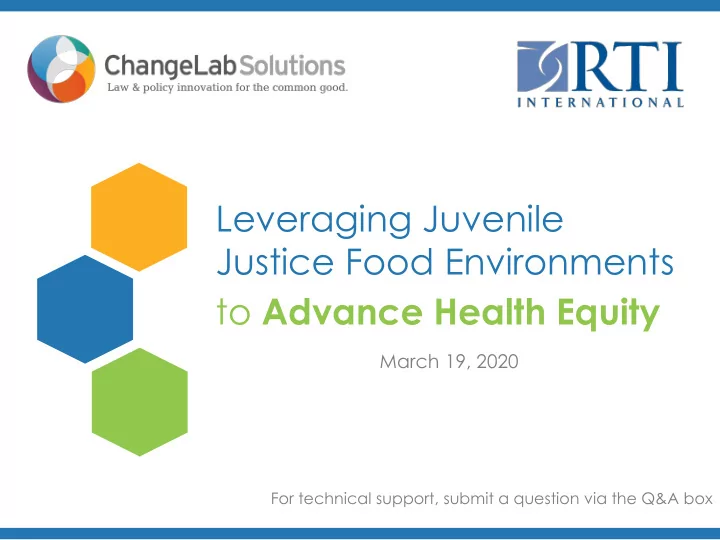

Leveraging Juvenile Justice Food Environments to Advance Health Equity March 19, 2020 For technical support, submit a question via the Q&A box
Who we are ChangeLab Solutions is a national organization that advances equitable laws and policies to ensure healthy lives for all. We prioritize communities whose residents are at highest risk for poor health. Our multidisciplinary team of lawyers, planners, policy analysts, and other professionals works with state and local governments, advocacy organizations, and anchor institutions to create thriving communities.
Kimberly Libman ChangeLab Solutions Nessia Berner Wong ChangeLab Solutions Kristen C. Giombi RTI International
Lynne Williams North Carolina Department of Public Safety Lauren Dawson Healthy Eating Research
AGENDA • Why are juvenile justice food environments important for health? • What’s happening at the national level? • What’s happening in North Carolina? • What’s next?
Why are juvenile justice food environments important for health equity ?
Health Equity & Youth Incarceration
What’s happening at the national level? Research methods & Key findings
Population Impact
Food environment components Food service & catering Commissaries & canteens Food in visiting areas Food gardens
Governance Landscape Regulatory levels that govern juvenile justice facilities
Key takeaways State governments are in a critical position to implement policy Focus on current gaps in meal service regulations Commissaries and other food sale points have potential for policy change
What’s happening in North Carolina? Key findings
12 residential facilities • 4 state-operated youth development centers (YDCs) 6 state-operated juvenile detention centers (JDCs) 2 county-operated NC Juvenile JDCs Justice Facility Average daily • Landscape population: 334 youth Average length of stay: • 358 days (YDCs) 17 days (JDCs)
Purposeful sample for • in-depth interviews: 5 of 12 juvenile Research justice residential Methods facilities in NC Child Nutrition Program Administrator at NC DPS Semi-structured • interview guides Short survey used to • focus interviews
Innovative Programming • Monthly taste tests • Nutritionists • Culinary classes • Informational events/fairs • Sensory garden • Initiatives involving parents • Greenhouse • Bulletin boards/posters
Required Participation in SBP & NSLP • NC DPS wellness policy requires all facilities to participate in SBP and NSLP • Do not participate in “offer versus serve” • 2 facilities participate in the Team Nutrition Program • No access to canteens, commissaries, or vending machines
No Specific Nutrition Requirements for Dinner • CNP Administrator at NC DPS determines the menus for facilities • Some flexibility allowed at dinner • Items served at dinner are similar to lunch but larger portions • Infrequently offer food from outside establishments • Serve garden produce as part of dinner meals
Including Healthy Eating in Youth Reentry Plans • Send home nutrition education and materials as part of youth’s reentry plans – Includes information on local food pantries, farmers markets, and social services – Sample menus and recipes • Importance of connecting with families
Nutrition Services at the North Carolina Department of Public Safety Operations on the ground
Successes Establishing local wellness policies & committees Awards: Recognized at local, state & national levels
Successes: Awards HealthierUS School Challenge Award – sponsored by USDA Food and Nutrition Service USDA Best Practice Award Golden Key Achievement Award – sponsored by School Nutrition Association of North Carolina Partner in Education Award – sponsored by School Nutrition Association of North Carolina Made by Milk Carton Contest – sponsored by Evergreen Packaging
Successes Culinary and Creative Arts Competition – sponsored by School Nutrition Association of North Carolina
Challenges • Complexity of Child Nutrition Program requirements • Procurement processes & guidelines • Menu planning/whole grain–rich criteria • Recruitment & retention of highly skilled foodservice professionals
Moving Forward: The Future • Streamline overly complex Child Nutrition Programs • Flexibility with meal pattern & dietary standards – breakfast • Advocacy group
What’s next?
Thank you! Questions? Keep the conversation going Kristen C. Giombi: kgiombi@rti.org Nessia Berner Wong: nbernerwong@changelabsolutions.org Kimberly Libman: klibman@changelabsolutions.org Lynne Williams: Lynne.Williams@ncdps.gov Lauren Dawson: ledawson@umn.edu
Recommend
More recommend